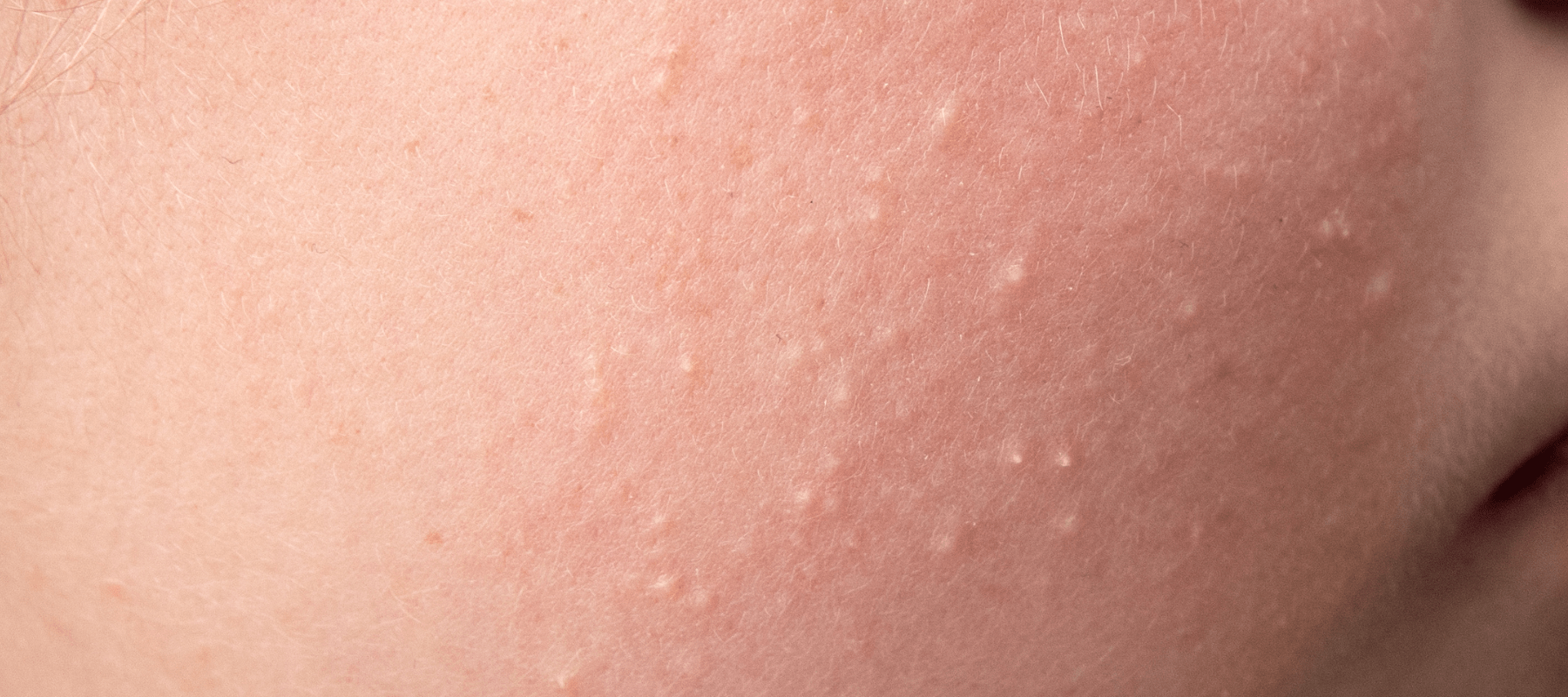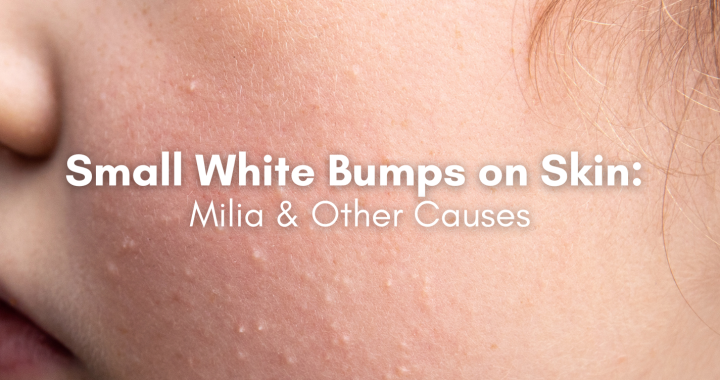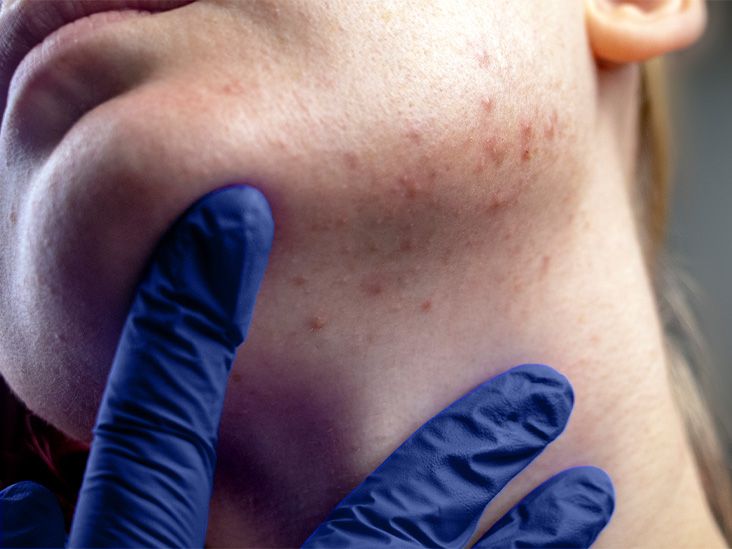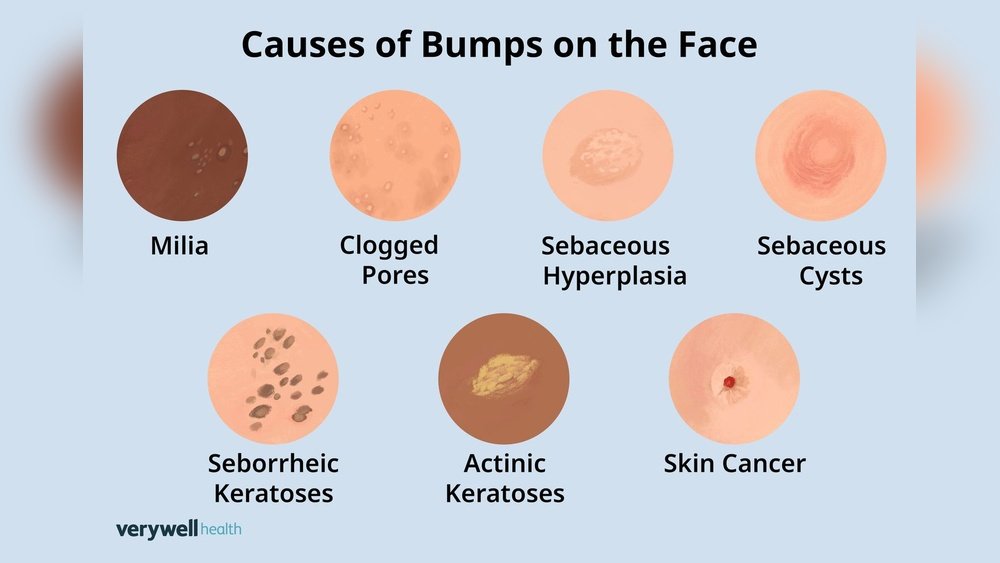Are you waking up to tiny pimples along your jawline and wondering why this is happening? Those small, stubborn bumps can be more than just annoying—they might be signaling something about your hormones, lifestyle, or habits.
Understanding the real causes behind these jawline pimples is the first step to clearing your skin for good. Whether it’s stress, diet, or the products you use daily, knowing what’s triggering your breakouts can help you take control and find the right solution.
Keep reading to discover the common causes of tiny pimples on your jawline and learn simple, effective ways to manage and prevent them. Your clearer, smoother skin starts here.

Credit: www.thepinkfoundry.com
Hormonal Shifts And Jawline Pimples
Hormonal shifts play a key role in causing tiny pimples on the jawline. These pimples often appear during changes in hormone levels. Hormones affect oil production in the skin. Excess oil clogs pores and leads to breakouts. The jawline area is especially sensitive to these changes. Understanding how hormones impact your skin helps manage and prevent these pimples.
Menstrual Cycle And Acne
During the menstrual cycle, hormone levels rise and fall. Just before your period, the body produces more androgen hormones. These hormones increase oil production in the skin. Excess oil blocks pores and causes pimples on the jawline. Many women notice more breakouts a few days before their period. This type of acne usually clears up after menstruation ends.
Pregnancy And Menopause Effects
Pregnancy causes major hormonal changes that affect the skin. Some women experience more pimples on their jawline due to increased hormone levels. After pregnancy, hormone levels drop, which may clear the acne. Menopause also changes hormone balance. Lower estrogen levels can cause drier skin and sometimes more breakouts. Both pregnancy and menopause affect how the skin produces oil and reacts to bacteria.
Polycystic Ovary Syndrome (pcos)
PCOS is a condition that causes hormone imbalance in women. It increases androgen levels, leading to more oil production. This often results in persistent pimples on the jawline and chin. PCOS acne can be deeper and harder to treat. Many women with PCOS also have other symptoms like irregular periods and weight gain. Managing PCOS with a doctor’s help can improve skin health and reduce breakouts.

Credit: www.vucare.com
Stress And Its Impact On Skin
Stress plays a major role in skin health. It can trigger tiny pimples on the jawline. The skin reacts to stress by changing hormone levels and oil production. These changes create an environment where pimples can form easily.
Understanding how stress affects your skin helps in managing these breakouts. Controlling stress can reduce pimples and improve overall skin appearance.
Cortisol And Oil Production
Cortisol is the stress hormone released by your body. High cortisol levels increase oil production in the skin’s glands. Excess oil clogs pores and causes pimples.
Stress also slows down skin healing. This makes pimples last longer and look worse. Jawline skin is sensitive and reacts quickly to cortisol changes.
Stress Management Tips
Reducing stress can calm your skin and lower pimples. Simple habits help manage stress daily. Try deep breathing exercises for quick relief.
Regular physical activity releases tension and balances hormones. Adequate sleep supports skin repair and keeps cortisol low. Avoid too much caffeine and sugar, which raise stress levels.
Taking time for hobbies or relaxation improves mood. Consistent stress control protects your skin and reduces jawline pimples.
Dietary Triggers To Watch
Diet plays a key role in the appearance of tiny pimples on the jawline. Certain foods can trigger inflammation and increase oil production. Identifying these dietary triggers helps control breakouts. Focus on what you eat to reduce jawline acne and improve skin health.
High-glycemic Foods And Sugars
High-glycemic foods cause blood sugar to spike quickly. This spike leads to increased insulin levels that boost oil production in the skin. Excess oil clogs pores and promotes pimples. Examples include white bread, sugary drinks, and sweets. Cutting back on these foods may reduce jawline pimples.
Dairy And Inflammation
Dairy products may cause inflammation in some people. This inflammation can worsen acne, especially on the jawline. Milk, cheese, and yogurt contain hormones that affect skin oil glands. Reducing dairy intake might help calm skin and reduce pimples. Monitor your skin’s response after cutting down dairy.
Friction And Irritation Factors
Friction and irritation often cause tiny pimples on the jawline. These factors irritate the skin, leading to inflammation and breakouts. Constant rubbing or pressure triggers acne, especially around the jaw area. Understanding these causes helps in preventing and treating jawline pimples effectively.
Acne Mechanica Explained
Acne mechanica forms from heat, pressure, and friction on the skin. It happens when tight clothing or equipment rubs against the jawline. Sweat trapped under this friction clogs pores. This type of acne appears as small pimples or bumps. It often affects athletes or people wearing helmets and chin straps.
Clothing And Equipment Effects
Tight collars, scarves, or chin straps can irritate the jawline skin. The fabric or material creates constant pressure and rubbing. This causes tiny pimples to develop in those areas. Sports gear like helmets or face masks also trap sweat and dirt. Cleaning these items regularly reduces irritation and prevents breakouts.
Cosmetic And Hair Product Influence
Tiny pimples on the jawline can often be linked to the products used on your skin and hair. Many cosmetics and hair care items contain ingredients that clog pores. These blockages trap oil and bacteria, causing pimples to form along the jawline. Understanding how these products influence your skin helps in preventing breakouts.
Hair products like gels, oils, and sprays may drip down your face throughout the day. This can cause irritation and clog pores near the jaw. Similarly, makeup products that are thick or oily can create a barrier on your skin. This barrier stops pores from breathing and leads to tiny pimples.
Noncomedogenic Product Choices
Choosing the right products is key to avoiding jawline pimples. Look for items labeled as noncomedogenic. These products are specially formulated not to block pores. Noncomedogenic makeup, moisturizers, and hair care products reduce the risk of breakouts.
Using lightweight, water-based products helps keep the skin clear. Avoid heavy creams or oils near your jawline. Always check ingredient lists to avoid pore-clogging substances like mineral oil or lanolin.
Cleaning Makeup Tools
Makeup brushes and sponges collect dirt, oil, and bacteria over time. Using dirty tools spreads these impurities on your skin. This can worsen pimples along the jawline. Regular cleaning of your brushes and sponges is essential.
Wash tools with mild soap and warm water at least once a week. Allow them to dry completely before use. Clean tools keep your skin healthier and reduce tiny pimple outbreaks near the jaw.

Credit: www.medicalnewstoday.com
Effective Care And Treatment
Effective care and treatment for tiny pimples on the jawline focus on reducing irritation and preventing new breakouts. Consistent skincare and the right products help calm the skin and clear clogged pores. Understanding how to treat these pimples gently improves skin health without causing more damage. Here are some key steps to follow for better skin.
Gentle Skincare Practices
Use a mild cleanser twice daily to remove dirt and oil. Avoid harsh scrubbing that can irritate the skin and worsen pimples. Pat your face dry with a soft towel instead of rubbing. Keep your hands away from your jawline to prevent spreading bacteria. Choose fragrance-free and noncomedogenic skincare products to avoid clogging pores. Moisturize with a light, oil-free lotion to keep skin balanced and hydrated.
Over-the-counter Options
Look for products containing salicylic acid or benzoyl peroxide. These ingredients help clear blocked pores and reduce inflammation. Start with a low concentration to see how your skin reacts. Apply spot treatments only on affected areas to avoid drying out healthy skin. Use sunscreen daily to protect your skin from sun damage, which can worsen pimples. Avoid heavy makeup and remove it thoroughly before bed.
When To See A Dermatologist
Consult a dermatologist if pimples persist despite home care. Seek help if breakouts become painful or cause scarring. A doctor can prescribe stronger treatments like topical or oral medications. They can also identify underlying causes such as hormonal imbalances. Early professional care prevents long-term skin problems and improves healing. Do not hesitate to get expert advice for stubborn jawline pimples.
Frequently Asked Questions
Why Am I Getting Pimples On My Jawline?
Pimples on the jawline often result from hormonal changes, stress, diet, and skin irritation. Using oily products or touching your face can worsen breakouts. Managing hygiene, reducing stress, and choosing noncomedogenic skincare help prevent jawline acne. Consult a dermatologist for persistent cases.
Does Acne On The Jawline Mean Pcos?
Acne on the jawline can indicate hormonal imbalance, including PCOS, but it’s not always the cause. Consult a doctor for accurate diagnosis.
Are Jawline Spots Hormonal?
Yes, jawline spots often result from hormonal changes during periods, pregnancy, or conditions like PCOS. Hormones increase oil production, causing breakouts. Managing stress, diet, and skincare can help reduce these hormonal spots effectively.
Why Am I Getting Little Bumps Under My Jawline?
Little bumps under your jawline often result from hormonal changes, stress, clogged pores, or irritation from products and friction. Maintaining gentle skincare, using noncomedogenic products, managing stress, and avoiding friction can help reduce these bumps. Consult a dermatologist for persistent cases.
Conclusion
Tiny pimples on the jawline often come from common causes like hormones, stress, and diet. Simple changes in skincare and habits can reduce them. Use gentle, noncomedogenic products and keep your skin clean. Watch what you eat and manage stress well.
Avoid touching your face and clean items that touch your jawline. Persistent acne may need a doctor’s advice. Taking these steps helps keep your skin clearer and healthier over time.
 Skip to content
Skip to content 